Kenneth L. Gentry Jr.'s Blog, page 100
April 8, 2016
GOD’S SOVEREIGNTY; OUR HOPE (2)
 PMT 2016-023 by Kenneth L. Gentry, Jr.
PMT 2016-023 by Kenneth L. Gentry, Jr.
This is the second in a brief series on God’s sovereignty as our hope for the gospel’s conquering the world for Christ. I am writing this to encourage postmillennialists to maintain their hope in Scripture’s prophecies despite the widespread and increasing collapse of our culture in America.
God has an elect people. And they will grow in number as God sovereignly calls them to himself as history unfolds. Once again, the Scriptures are clear: God sovereign calls and saves sinners in his own time according to his own plan. Let us review some Scriptures that speak of God’s sovereign call.
And God said unto Abraham, Let it not be grievous in thy sight because of the lad, and because of thy bondwoman; in all that Sarah hath said unto thee, hearken unto her voice; for in Isaac shall thy seed be called. (Gen 21:12–13)
For thou art an holy people unto the LORD thy God: the LORD thy God hath chosen thee to be a special people unto himself, above all people that are upon the face of the earth. The LORD did not set his love upon you, nor choose you, because ye were more in number than any people; for ye were the fewest of all people: But because the LORD loved you, and because he would keep the oath which he had sworn unto your fathers, hath the LORD brought you out with a mighty hand, and redeemed you out of the house of bondmen, from the hand of Pharaoh king of Egypt. (Deut 7:6–8)
Blessed is the nation whose God is the LORD, / The people whom he hath chosen for his own inheritance. (Psa 33:12)
Election and Free Will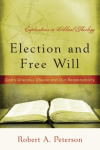
by Robert A. Peterson
Election and Free Will helps Christians who believe in a Reformed view of predestination to better understand their faith. Robert A. Peterson traces Scripture’s teaching on election through the Bible and explains the doctrine of free will. He also tackles objections to predestination and concludes with applications of this neglected biblical teaching.
See more study materials at: www.KennethGentry.com
How blessed is the one whom Thou dost choose, and bring near to Thee, / To dwell in Thy courts. / We will be satisfied with the goodness of Thy house, / Thy holy temple. (Psa 65:4)
All things have been handed over to Me by My Father; and no one knows the Son, except the Father; nor does anyone know the Father, except the Son, and anyone to whom the Son wills to reveal Him. (Matt 11:27)
So the last shall be first, and the first last: for many be called, but few chosen. (Matt 20:16)
Shall not God bring about justice for His elect, who cry to Him day and night, and will He delay long over them? (Luke 18:7)
All that the Father gives Me will come to Me, and the one who comes to Me I will by no means cast out. (John 6:37)
And this is the Father’s will which hath sent me, that of all which he hath given me I should lose nothing, but should raise it up again at the last day. (John 6:39)
No man can come to me, except the Father which hath sent me draw him: and I will raise him up at the last day. (John 6:44)
I speak not of you all: I know whom I have chosen: but that the scripture may be fulfilled, He that eateth bread with me hath lifted up his heel against me. (John 13:18)
You did not choose Me, but I chose you and appointed you that you should go and bear fruit. (John 15:16a)
If ye were of the world, the world would love his own: but because ye are not of the world, but I have chosen you out of the world, therefore the world hateth you. (John 15:19)
Jesus spoke these words, lifted up His eyes to heaven, and said: Father, the hour has come. Glorify Your Son, that Your Son also may glorify You, as You have given Him authority over all flesh, that He should give eternal life to as many as You have given Him. (John 17:1–2)
I have manifested thy name unto the men which thou gavest me out of the world: thine they were, and thou gavest them me; and they have kept thy word. . . . I pray for them: I pray not for the world, but for them which thou hast given me; for they are thine. (John 17:6, 9)
For the promise is unto you, and to your children, and to all that are afar off, even as many as the Lord our God shall call. (Acts 2:39)
Now when the Gentiles heard this, they were glad and glorified the word of the Lord. And as many as had been appointed to eternal life believed. (Acts 13:48)
And he said, “The God of our fathers hath chosen thee, that thou shouldest know his will, and see that Just One, and shouldest hear the voice of his mouth.” (Acts 22:14)
Amillennialism v. Postmillennialism Debate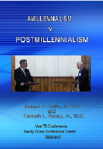
(DVD by Gentry and Gaffin)
Formal, public debate between Dr. Richard Gaffin (Westminster Theological Seminary)
and Kenneth Gentry at the Van Til Conference in Maryland.
See more study materials at: www.KennethGentry.com
(For the children not yet being born, nor having done any good or evil, that the purpose of God according to election might stand, not of works but of Him who calls), it was said to her, “The older shall serve the younger.” As it is written, “Jacob I have loved, but Esau I have hated.” What shall we say then? Is there unrighteousness with God? Certainly not! For He says to Moses, “I will have mercy on whomever I will have mercy, and I will have compassion on whomever I will have compassion.” So then it is not of him who wills, nor of him who runs, but of God who shows mercy. For the Scripture says to Pharaoh, “For this very purpose I have raised you up, that I may show My power in you, and that My name may be declared in all the earth.” Therefore He has mercy on whom He wills, and whom He wills He hardens. You will say to me then, “Why does He still find fault? For who has resisted His will?” But indeed, O man, who are you to reply against God? Will the thing formed say to him who formed it, “Why have you made me like this?” Does not the potter have power over the clay, from the same lump to make one vessel for honor and another for dishonor? What if God, wanting to show His wrath and to make His power known, endured with much longsuffering the vessels of wrath prepared for destruction, and that He might make known the riches of His glory on the vessels of mercy, which He had prepared beforehand for glory. (Rom 9:11–23)
What then? That which Israel is seeking for, it has not obtained, but those who were chosen obtained it, and the rest were hardened. (Rom 11:7)
For ye see your calling, brethren, how that not many wise men after the flesh, not many mighty, not many noble, are called: But God hath chosen the foolish things of the world to confound the wise; and God hath chosen the weak things of the world to confound the things which are mighty; and base things of the world, and things which are despised, hath God chosen, yea, and things which are not, to bring to nought things that are: That no flesh should glory in his presence. (1 Cor 1:26–29)
But we speak the wisdom of God in a mystery, even the hidden wisdom, which God ordained before the world unto our glory. (1 Cor 2:7)
For to you it has been granted for Christ’s sake, not only to believe in Him, but also to suffer for His sake. (Phil 1:29)
It is God who is at work in you, both to will and to work for His good pleasure. (Phil 2:13)
Put on therefore, as the elect of God, holy and beloved, bowels of mercies, kindness, humbleness of mind, meekness, longsuffering. (Col 3:12)
Knowing, brethren beloved by God, His choice of you; for our gospel did not come to you in word only, but also in power and in the Holy Spirit and with full conviction; just as you know what kind of men we proved to be among you for your sake. (1 Thess 1:4–5)
That ye would walk worthy of God, who hath called you unto his kingdom and glory. (1 Thess 2:12)
For God has not destined us for wrath, but for obtaining salvation through our Lord Jesus Christ. (1 Thess 5:9)
But we are bound to give thanks to God always for you, brethren beloved by the Lord, because God from the beginning chose you for salvation through sanctification by the Spirit and belief in truth, to which He called you by our gospel, for the obtaining of the glory of our Lord Jesus Christ. (2 Thess 2:13, 14)
Who has saved us and called us with a holy calling, not according to our works, but according to His own purpose and grace which was given to us in Christ Jesus before time began. (2 Tim 1:9)
And all that dwell upon the earth shall worship him, whose names are not written in the book of life of the Lamb slain from the foundation of the world. (Rev 13:8)
The beast that you saw was, and is not, and will ascend out of the bottomless pit and go to perdition. And those who dwell on the earth will marvel, whose names are not written in the Book of Life from the foundation of the world, when they see the beast that was, and is not, and yet is. (Rev 17:8)
With such a God, how can we lose hope? God is at work in you and in this world.
Click on the following images for more information on these studies:


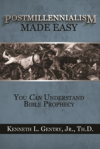








April 5, 2016
GOD’S SOVEREIGNTY; OUR HOPE (1)
 PMT 2016-022 by Kenneth L. Gentry, Jr.
PMT 2016-022 by Kenneth L. Gentry, Jr.
We live in an era of wholesale moral, cultural, and moral collapse. Our nation was founded on Christian principle, but today we are witnessing the ever quickening collapse of our society. And I say this as a postmillennialist. Is there any hope for our future?
The answer, of course, is: “Yes!” We must still maintain the postmillennial hope flowing out of biblical prophecy. And we may do so because the God of hope is a sovereign Lord. The Scriptures are abundantly clear that he is the absolute sovereign who is in ultimate control of history. Postmillennialists need to be apprised of his sovereignty, so that they may always keep their eyes looking above to him and his sovereign plan.
In this brief series I will be dealing with the sovereignty of God as an essential foundation for the postmillennial hope. Though things currently looking dismal, we must remember: “it ain’t over til it’s over”! Christ has not returned yet, so no one can say on the basis of contemporary historical analysis that postmillennialism is false. And as we recognize this we must remember the Bible’s repeated declarations that God is sovereign. We are encouraged when we look at the plan of God, not when we look at the sinfulness of man.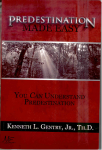
Predestination Made Easy
(by Ken Gentry)
A thoroughly biblical, extremely practical, and impressively clear presentation of
the doctrine of absolute predestination.
See more study materials at: www.KennethGentry.com
The Scriptures declare God’s absolute sovereignty in unmistakable terms. Consider the following powerful assertions.
But indeed for this purpose I have raised you up, that I may show My power in you, and that My name may be declared in all the earth. (Exo 9:16)
And he said, “I will make all my goodness pass before thee, and I will proclaim the name of the LORD before thee; and will be gracious to whom I will be gracious, and will shew mercy on whom I will shew mercy.” (Exo 33:19)
For it was of the LORD to harden their hearts, that they should come against Israel in battle, that he might destroy them utterly, and that they might have no favour, but that he might destroy them, as the LORD commanded Moses. (Josh 11:20)
Then Job answered the Lord, and said, / “I know that Thou canst do all things, / and that no purpose of Thine can be thwarted.” (Job 42:1–2)
Our God is in the heavens; / He does whatever He pleases. (Psa 115:3)
Whatever the Lord pleases, He does, / In heaven and in earth, in the seas and in all deeps. (Psa 135:6)
The LORD hath made all things for himself: yea, even the wicked for the day of evil. (Prov 16:4 KJV)
In his heart a man plans his course, but the Lord determines his steps. (Prov 16:9)
The Lord of hosts has sworn saying, “Surely, just as I have intended so it has happened, and just as I have planned so it will stand, for the Lord of hosts has planned, and who can frustrate it? And as for His stretched-out hand, who can turn it back?” (Isa 14:24, 27)
And who is like Me? Let him proclaim and declare it; / Yes, let him recount it to Me in order, / From the time that I established the ancient nation. / And let them declare to them the things that are coming / And the events that are going to take place. (Isa 44:7)
Declaring the end from the beginning / And from ancient times things which have not been done, / Saying, “My purpose will be established, / And I will accomplish all My good pleasure; / Calling a bird of prey from the east, / The man of My purpose from a far country. / Truly I have spoken; truly I will bring it to pass. / I have planned it, surely I will do it.” (Isa 46:10–11)
Now the word of the Lord came to me saying, / Before I formed you in the womb I knew you, / And before you were born I consecrated you; / I have appointed you a prophet to the nations. (Jer 1:4–5)
If a trumpet is blown in a city will not the people tremble? / If a calamity occurs in a city has not the Lord done it? (Amos 3:6)
At that time Jesus answered and said, “I thank thee, O Father, Lord of heaven and earth, because thou hast hid these things from the wise and prudent, and hast revealed them unto babes. Even so, Father: for so it seemed good in thy sight.” (Matt 11:25–26)
Then shall the King say unto them on his right hand, “Come, ye blessed of my Father, inherit the kingdom prepared for you from the foundation of the world.” (Matt 25:34)
And he said, “Unto you it is given to know the mysteries of the kingdom of God: but to others in parables; that seeing they might not see, and hearing they might not understand.” (Luke 8:10)
Him, being delivered by the determinate counsel and foreknowledge of God, ye have taken, and by wicked hands have crucified and slain. (Acts 2:23)
For truly in this city there were gathered together against Thy holy servant Jesus, whom Thou didst anoint, both Herod and Pontius Pilate, along with the Gentiles and the peoples of Israel, to do whatever Thy hand and Thy purpose predestined to occur. (Acts 4:27–28)
And [God] hath made of one blood all nations of men for to dwell on all the face of the earth, and hath determined the times before appointed, and the bounds of their habitation. (Acts 17:26)
(book by R. C. Sproul)
From the angels’ revelation of Jesus’ glory to the shepherds outside Bethlehem,
to Jesus’ life-changing revelation of His glory to Paul on the Damascus road, Sproul guides us to a deeper understanding of Christ’s glory.
For more study materials: www.KennethGentry.com
But when it pleased God, who separated me from my mother’s womb, and called me by his grace. . . . (Gal 1:15)
For we are His workmanship, created in Christ for good works, which God prepared before hand that we should walk in them. (Eph 2:10)
Who verily was foreordained before the foundation of the world, but was manifest in these last times for you. (1 Pet 1:20)
With such pronouncements, we must never despair from the railing of man. God is in control; he can and will effect his ultimate plan regardless of the sinfulness of man. Take heart, postmillennialists, in your sovereign Lord. And return for my next installment on “God’s Sovereignty and our Hope.”








April 1, 2016
CREATION AND CONSUMMATION (4)
 PMT-2016-021 by Kenneth L. Gentry, Jr.
PMT-2016-021 by Kenneth L. Gentry, Jr.
I am returning to my analysis of the Framework Hypothesis which overthrows the long-held traditional interpretation of Gen 1 by changing the clear message of the creation narrative in Genesis 1. As noted previously, this is significant for the postmillennialist in that the postmillennial argument literally begins “In the beginning.”
In the two previous articles I quickly presented and briefly rebutted the first two arguments for the Framework view: (1) The triad of days (i.e., the framework) in Genesis 1. (2) The new interpretation of Gen 2:5 which allegedly presents God’s modus operandi in creation week (i.e., slow providence rather than instant miracle). In this article we come to the final theological argument for the Framework Hypothesis that Meredith Kline and his disciples employ: the two-register cosmogony.
The two-register cosmogony explained
Meredith Kline not only created the new and innovative providence argument based on Gen 2:5, but later developed an all-new and rather complicated final argument for the Framework Hypothesis. Kline deems the two-register cosmogony to be the umbrella argument that covers the triad and providence arguments.
By this “two-register” idea Kline is speaking of the upper register (the realm of God’s special presence, heaven) and the lower register (the realm of man’s habitation, the cosmos). He argues that Genesis 1 speaks sometimes of the upper register and sometimes of the lower register,; and he argues that we must recognize where the shifts of thought occur.
Election and Free Will
by Robert A. Peterson
Election and Free Will helps Christians who believe in a Reformed view of predestination to better understand their faith. Robert A. Peterson traces Scripture’s teaching on election through the Bible and explains the doctrine of free will. He also tackles objections to predestination and concludes with applications of this neglected biblical teaching.
See more study materials at: www.KennethGentry.com
Particularly significant for the Six-day Creation view, Kline declares that the “days” of Genesis 1 belong to the upper register. They are a part of the analogical relationship between the upper and lower registers. The days are therefore not to be understood as literal, lower register time-frames, but as metaphors that use man’s work week to symbolically portray God’s work “week.”
Kline presents a few reasons for his creation (!) of this new approach (which makes his view a “new creation,” apparently!). Underscoring the supposition that Moses is speaking metaphorically are subtle evidences from the text. I will mention two of those.
First, the revelation of God’s creation of Adam employs anthropomorphism. It speaks of God’s work by employing the metaphor of a potter: “Then the LORD God formed man of dust from the ground, and breathed into his nostrils the breath of life; and man became a living being” (Gen 2:7). Clearly God did not literally use a potter’s wheel for creating Adam, this is an anthropomorphism (using things that belong to man [anthropos] and applying them to God).
Second, God “rests” on the seventh day: “God blessed the seventh day and sanctified it, because in it He rested from all His work which God had created and made” (Gen 2:3). This is another anthropomorphism which presents something that man would need to do, not God. It is applied metaphorically from man’s experience in the lower register to God in the upper register.
The two-register cosmogony critiqued
Two main problems undercut Kline’s argument that the days of creation are metaphors speaking of God’s upper register work: First, this idea contradicts the clear and express meaning of Exodus 20:11: “six days you shall labor and do all your work. . . for in six days the Lord made the heavens and the earth.” This informs us that man’s week is rooted in God’s original creation. Kline’s view has the matter exactly backwards of what God says.
Second, Kline uses anthropomorphisms in a new and unique way. Historically, anthropomorphism applies features of man’s being to God’s being, i.e., features of man’s body to God who does not have a body. We see this when Scripture speaks of the arm of the Lord, or the eyes of the Lord, and so forth.
And even beyond these major problems, we find that Kline really does not interpret these Genesis texts and images properly when he analyzes them. For instance, when God “formed” Adam’s body, Moses does not mention anything such as God using his “arms” and “back” in digging up the soil for this special project — though he can speak of God’s redemptive activity by using “arm” imagery elsewhere (Exo. 6:6; 15:16; Deut. 4:34; 5:15). Nor do we discover a reference to the Lord’s “hands” and “fingers” carefully sculpting Adam’s body, as in the metaphorical potter imagery found in the prophets (Isa. 45:9; 64:8; Jer. 18:4-6; Lam. 4:2). Genesis 2 presents a bold, supernatural event in unadorned, factual form: God formed Adam’s body from the ground — without detailing how he did it.
Thus, anthropomorphism is actually avoided in this revelation of the historical fact of God’s creative activity. Furthermore, over against any alleged anthropomorphic imagery in Genesis 2:7, we learn that Adam’s body was formed from the dry “dust from the ground” — not “clay” as employed in the familiar potter’s art in Israel (cf. Isa. 29:16; 41:25; 45:9; Jer. 18:4, 6). Even Genesis commentator Victor Hamilton observes of the verb Moses employs: “‘Potter,’ however, is a suitable translation only when the context clearly points to the fact that the work of formation being described is that of a potter.”
Bringing Heaven Down to Earth
(by Nathan Bierma)
A Reformed study of heaven. By taking a new look at the biblical picture of heaven,
Nathan Bierma shows readers how heaven can be a relevant, meaningful,
inspiring engine of Christian faith and kingdom service.
See more study materials at: www.KennethGentry.com
Also regarding the word “rest” found in Gen 2:2–3: neither is this an anthropomorphism. After all, the text of Gen 2:2-3 does not speak anthropomorphically of God “resting,” as if relaxing. It actually informs us that God “ceased” his labor. As Genesis commentator Kenneth Mathews observes: “The verb translated ‘rested’ here means ‘the cessation of creative activity’; it has this same sense in its only other occurrence in Genesis, where God promises the postdiluvian world that the times and seasons ‘will never cease’ (8:22).”
Elsewhere we find that God ‘rested’ (nûah, Exod 20:11; napaš, 31:17), but here in Gen 2 the passage speaks of the absence of work — ‘he abstained’ from work.” That is, God did not relax as if from weariness (as does man); he simply ceased from his creating work (creation week is over).
Actually the text is even stronger, for as Umberto Cassuto puts it: “this verb has been translated or interpreted by many as if it signified ‘to rest’ or ‘to cease work’; but this is incorrect. It has a negative connotation: ‘not to do work.’” And most certainly it is literally true that God ceased his creative working. Though it was not a laborious chore for him, it was most definitely “work” that effected something — the universe.
Thus, Kline’s new argument that Gen 2 involves anthropomorphism that allows us to read anthropomorphism into the creation days of Gen 1 fails. The majestic march of days in Gen 1 are clearly literal, successive, chronological days of creation week which serve as the basis for man’s work week.








March 29, 2016
CREATION AND CONSUMMATION (3)
 PMT-2016-020 by Kenneth L. Gentry, Jr.
PMT-2016-020 by Kenneth L. Gentry, Jr.
As I have been noting in this series: creation and consummation are theologically-linked in Scripture. Therefore, a proper view of creation is significant for the eschatological argument for postmillennialism. Simply put: if you do not begin right, you will not end right. Therefore, when I present a full argument for postmillennialism, I begin with creation.
Not only am I a postmillennialist, but I am also a Six-day Creationist, hence a non-evolutionist.
In this series I am defending Six-day Creation against the Framework Hypothesis by demonstrating the Framework’s errors. This hypothesis is as a major evangelical opponent of Six-day Creation, and not surprisingly, is held mainly by amillennialists.
I am drawing the material for this series from my recently released book, As It Is Written: The Genesis Account: Literal or Literary? In that book you will find a thorough analysis of the issues that I can only summarize here. In the previous article I highlighted the triad of days argument which gives the “Framework” Hypothesis its name: the triad presents the framework that Moses used for presenting the fact of creation. In this article I will present a second major argument for this theistic-evolutionary interpretation of Genesis 1–2.
The providence argument
In Genesis 2:5 we read:
“Now no shrub of the field was yet in the earth, and no plant of the field had yet sprouted, for the Lord God had not sent rain upon the earth; and there was no man to cultivate the ground.”
In 1957 Old Testament theologian Meredith Kline developed this verse into an argument supporting the Framework Hypothesis. He holds that this verse establishes God’s mode of operation during the creation week which shows that he used slow providence rather than instantaneous miracle.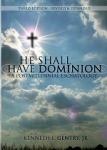
He Shall Have Dominion
(paperback by Kenneth Gentry)
A classic, thorough explanation and defense of postmillennialism (600+ pages). Complete with several chapters answering specific objections.
See more study materials at: www.KennethGentry.com
Kline argues that this verse speaks of “day” three of creation when God created plant life. He sees this verse as suggesting that the plants had to gradually sprout and slowly grow with the application of water — just as they do today. This would take time, much more time than the few hours of the third “day” of creation. And this shows that God used providence rather than miracle in creation week. Kline emphaticalliy declares that this is “conclusive exegetical evidence . . . that prevents anyone who follows the analogy of Scripture from supposing that Genesis 1 teaches a creation in the space of six solar days.”
The providence error
Unfortunately, this argument will not hold water, you might say. I would note that Kline misses the point of Moses’ statement.
Kline himself admits that this is a new view. In fact, it is an understanding of Gen 2:5 and creation that had escaped 3500 years of Jewish exegesis and 2000 years of Christian exegesis. Not only so, but the majority of contemporary Genesis commentators do not adopt it — even when they hold to theistic-evolution (as most of them do).
Rather than indicating slow providence as God’s creation method, this verse serves contextually to anticipate the main point of the creation narrative: the creation and testing of God’s moral creature, man. That is, it anticipates Adam’s temptation and fall. Let me explain.
Gen 2:5 is focusing on the garden in Eden, not the world at large. Significantly, God’s name appropriately changes from Elohim (“the strong one”) as the Creator of the entire universe throughout Gen. 1 to Yhwh in Gen. 2 because this is his personal, relational, covenant name. Not only so, but Gen 2 is highlighting Day 6 (the day of man’s creation), not Day 3.
As It Is Written: The Genesis Account Literal or Literary?
Book by Ken Gentry
Presents the exegetical evidence for Six-day Creation and against the Framework Hypothesis.
See more study materials at: www.KennethGentry.com
Furthermore, Gen 2:4 shows that the actions in Gen 2:5ff are the results of God’s creative work in Gen 1:1–2:3. Gen 2:4 reads: “This is the account of the heavens and the earth when they were created, in the day that the LORD God made earth and heaven.” The phrase “this is the account” in Hebrew is toledoth. This “account” continues until the next toledoth statement at Gen 5:1 (which gives the “result” of Adam: his offspring). Therefore, this section covers Adam’s creation, testing, and fall which result from God’s creating Adam.
Consequently, Gen 2:5 anticipates the fall which impacts the rest of this section. In Gen 2:5 we read of the “shrub of the field” and the “plant of the field,” while in Gen 2:7 we read of Adam’s formation from “dust.” These are reported in such a way as to point ahead to their reappearance in God’s curse for Adam’s sin. How so?
In Gen 3:17-19 we read:
“Cursed is the ground because of you; in toil you shall eat of it all the days of your life. Both thorns and thistles it shall grow for you; and you shall eat the plants of the field; by the sweat of your face you shall eat bread, till you return to the field, because from it you were taken; for you are dust, and to dust you shall return.”
The “plants of the field” in Gen 2:5 reappear in the exact phraseology in the curse section, whereas the “thorns and thistles” are a subset of the “shrub of the field.” And of course, the dust of Adam’s destruction reflects the dust of his composition.
Therefore, Gen 2 is focusing on the creation of man by the covenant God, and man’s moral testing at the tree of the knowledge of good and evil (Gen 2:16–17), which results in his fall (Gen 3:1–7). Gen 2:5 has nothing to do with ordinary providence, but with an extraordinary test; a test which results in the fall of man that dominates the whole rest of Scripture.
In this regard, we must note that Gen 2:3 concludes the general survey of creation week (and should really be in Gen 1) while Gen 2:4 introduces the “account” or results or offspring of God’s original creation: man’s fall. It is explaining what happened to God’s “very good” creation, since creation is no longer “very good.”
In my next article I will highlight the last of the three main foundation stones for the Framework Hypothesis. Hopefully that article will not be too slow in coming, if you know what I mean!
Click on the following images for more information on these studies:











March 24, 2016
CREATION AND CONSUMMATION (2)
 PMT-2016-019 by Kenneth L. Gentry, Jr.
PMT-2016-019 by Kenneth L. Gentry, Jr.
In my last blog article I began presenting my latest book, As It Is Written, which is on creation. Creation necessarily impacts consummation because of the linear progress of history under God’s sovereignty. Therefore the postmillennialist should be interested in creation issues. And Six-day creation is a strong foundation stone for the postmillennial hope.
A rehearsal of the Framework argument
In that last article I pointed out the three exegetical foundations to the Framework Hypothesis, a major evangelical re-interpretive approach to the Creation narrative. I will quickly repeat those here, this provide a brief rebuttal to each. My book should be consulted for a thorough response.
The Framework Hypothesis argues that:
(1) Genesis 1 is structured around a literary triad of days that are not intended to be understood as chronological and historical, but theological and literary. Framework advocates argue that the creation of light on Day 1 parallels the creation of the sun on Day 4 and are therefore not successive days, but two ways of saying the same thing. The same is true of Day 2 (waters and sky) paralleling Day 5 (fish and birds), as wells as Day 3 (land) paralleling Day 6 (land animals and man).
As It Is Written: The Genesis Account Literal or Literary?
Book by Ken Gentry
Presents the exegetical evidence for Six-day Creation and against the Framework Hypothesis.
See more study materials at: www.KennethGentry.com
(2) Genesis 2:5 sets forth the providential nature of creation which rejects any need for “unnecessary supernaturalism.” In the Framework understanding this verse requires that we recognize the operation of slow, normal providence in creation week. They believe this verse is teaching us that there were no plants until it rained, which is the way the world operates today.
(3) The six-days of creation are present by way of analogy when we recognize a two-register cosmogony (God’s eternal realm v. man’s temporal realm). They see Moses as using man’s seven-day work week as an analogy of God’s altogether different creation work. The six-days of creation are simply a symbolic, not literal.
A rebuttal to the Framework Triad argument
My book, As It Is Written, should be consulted for a detailed rebuttal with full documentation. But just quickly I would note the following problems with the three-fold Framework argument.
Regarding the so-called triad of Genesis 1, with days 1, 2, and 3 paralleling days 4, 5, and 6, we must note that the triad lacks expected symmetry. And if Moses is presenting creation as a literary flourish as if it took God six days, then he failed.
We must recognize that the water of Day 2 which correspond to the fish of Day 5 were actually created on Day 1 (note Gen 1:2). The seas in which the Day 5 fish swim, are not named as “seas” until Day 3. The seas specifically named on Day 3 have no corresponding agent on Day 6. The birds of Day 5 are associated with both the sky (of Day 2) and the land (of Day 3) according to Gen 1:20 and 22.
Furthermore, the alleged “literary” beauty is marred by God “blessing” on Days 5, 6, and 7, but not only Days 1, 2, 3, and 4. It is also marred by each day being declared “good,” except for Day 2. And Day 3 has two such benedictions.
Should Christians Embrace Evolution?
by Norman Nevin
Thirteen scientists and theologians offer valuable perspectives on evolution for concerned Christians.
See more study materials at: www.KennethGentry.com
We should also ask whether these occasional elements of the triad can overthrow the majestic march of days in Gen 1. The days of creation are emphasized as sequential with the clear numerical adjectives (first, second, third, etc.) attached to each of the six creation days.
In the final analysis, why would a literary beauty necessarily stand against a literal reality? God is a God of order and beauty. He surely could create the world in the order of the narrative while allowing for such a parallel between the first and second triad of days.
In my next article I will highlight the problem with the Framework view of Gen 2:5. But again, my book presents these matters in great detail.









March 21, 2016
CREATION AND CONSUMMATION (1)
 PMT-2016-018 by Kenneth L. Gentry, Jr.
PMT-2016-018 by Kenneth L. Gentry, Jr.
The postmillennial hope looks to the unfolding victory of Christ’s kingdom in history. In fact, the glorious dominance of his kingdom is the very goal of history. God’s plan was for man to exercise dominion over all creation (Gen 1:26–28). Immediately upon Adam’s Fall, God instituted redemption which was designed to crush the head of Satan and his kingdom (Gen 3:15).
Later God informs Abraham of his plan for universal blessing that was to be brought through him: “In you all families of the earth will be blessed” (Gen 12:3b). And King David rejoiced in this prospect:
“All the ends of the earth will remember and turn to the LORD, / And all the families of the nations will worship before You. / For the kingdom is the LORD’S / And He rules over the nations.” (Psa 22:27–28)
Given God’s plan and his sending his own Son to accomplish that plan, Jesus declared as he faced the cross: “Now judgment is upon this world; now the ruler of this world will be cast out. And I, if I am lifted up from the earth, will draw all men to Myself” (John 12:31–32). Christ fully and confidently expected historical victory for God’s plan, and therefore commissioned us to labor for it:
“Jesus came up and spoke to them, saying, ‘All authority has been given to Me in heaven and on earth. Go therefore and make disciples of all the nations, baptizing them in the name of the Father and the Son and the Holy Spirit, teaching them to observe all that I commanded you; and lo, I am with you always, even to the end of the age’” (Matt 28:18–20).
As It Is Written: The Genesis Account Literal or Literary?
Book by Ken Gentry
Presents the exegetical evidence for Six-day Creation and against the Framework Hypothesis.
See more study materials at: www.KennethGentry.com
Jesus was confident in his Father’s plan and his own authority. And so should we be.
Creation Is Linked to Consummation
As I point out in my book He Shall Have Dominion, creation and consummation are intrinsically related. In biblical theology, eschatology requires protology. This is because as Genesis commentator John Currid notes: “the Hebrews held to a linear history. They believed there was a beginning to time and creation (cosmogony) and a movement to a consummation (eschatology).” The end is entailed in the beginning.
I am as strongly a Six-day Creationist as I am a postmillennialist. I believe the two go together well: both approach Scripture seriously; both help frame in a holistic world-and-life view; and both are firmly committed to the historical trustworthiness of the biblical record — regardless of what liberals and pagans think. Therefore, both Six-day Creationism and postmillennialism are abhorrent to the unbeliever, but should be admired by the believer.
I have recently written a book that has been published by New Leaf Press (February 2016). It is titled: As It Is Written: The Genesis Account Literal or Literary? In this work I basically seek to accomplish two ends: (1) Demonstrate the exegetical and theological foundations for Six-day Creation; and (2) Highlight the exegetical and theological errors of the Framework Hypothesis. I believe this is important to do — as a foundation to the postmillennial hope.
I open As It Is Written with the question: Why should we study Creation? I provide a six-point rationale that was presented by theologian Millard Erickson:
1. The Bible stresses this doctrine, even opening with it.
2. The doctrine of creation is in creeds, showing it is an important element in traditional Christianity.
3. The unity of biblical doctrine requires the doctrine of origins: we have eschatology and therefore need protology.
4. The biblical doctrine of creation is distinctively different from other religions and philosophies, and therefore sets Christianity apart from them.
5. Biblical creation confronts modern secular, naturalistic science, which is dominating our culture and is the Christian faith’s leading philosophical enemy.
6. The doctrine of creation is essential to the ultimacy of God: it declares that God alone is creator of universe.
Adam in the New Testament
by J. P. Versteeg
Carefully examining key passages of Scripture, Versteeg proves that all human beings descended from Adam, the first man. He argues that if this is not true, the entire history of redemption documented in Scripture unravels and we have no gospel in any meaningful sense.
See more study materials at: www.KennethGentry.com
The Framework Hypothesis
One of the leading evangelical re-interpretations of the Genesis creation narrative today is the Framework Hypothesis. This hypothesis holds that Genesis 1:1–2:3 presents God’s creation as a seven-day week for a literary (theological and symbolic) framework and is not intended to indicate the literal chronology or duration of the acts of creation.
As I show in great detail, the Framework Hypothesis is built on three exegetical foundations:
(1) The triad of days. This argues that the creation of light on Day 1 parallels the creation of the sun on Day 4 and are therefore not successive days, but two ways of saying the same thing. The same is true of Day 2 (waters and sky) paralleling Day 5 (fish and birds), as wells as Day 3 (land) paralleling Day 6 (land animals and man).
(2) The providence of creation. This understand Genesis 2:5 as declaring that God used ordinary, gradualistic providence in Creation week and avoided “unnecessary supernaturalism.” Meredith Kline states regarding this verse that it provides “conclusive exegetical evidence . . . that prevents anyone who follows the analogy of Scripture from supposing that Genesis 1 teaches a creation in the space of six solar days.”
This is drawn from the following biblical statement: “Now no shrub of the field was yet in the earth, and no plant of the field had yet sprouted, for the Lord God had not sent rain upon the earth; and there was no man to cultivate the ground.” This, according to the Framework advocates, states that before plants cold sprout, rain had to begin — which is the natural way things are today.
(3) The two-register cosmogony. That is, Klinean Framework proponents argue that interpreters must recognize that Gen 1–2 involves two perspectives: the one from above (God’s heavenly world) and the one from below (the temporal, earthly order). They warn that we must recognize some aspects of the Creation narrative present an analogical perspective on creation. That is, it presents God’s work in “creation week” analogically, using man’s experience as an analogy of God’s work. Therefore, Moses employed a seven-day week to present Creation because man has a seven-day week.
In my next article I will briefly demonstrate the error in the three-fold exegetical argument for the Framework. In the meantime, don’t work too hard: don’t engage the Beatles’ suggestion of “Eight Days a Week.” God only gave us seven!
Click on the following images for more information on these studies:

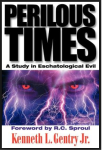









March 2, 2016
POSTMILLENNIALISM TODAY CHANGES
Dear PostmillennialismToday readers:
Thank you so much for reading and interacting with my blog over the past few years. I have enjoyed posting articles and interacting with you.
Due to my writing schedule, however, I am now going to have to reduce my blog posting from twice a week to only occasionally. I regret that I have to reduce my blogging, but I really must do so at the present time. I hope one day to be able to pick up the pace.
I have recently finished a new book, As It Is Written. And I am finishing the editing of my two-volume commentary on Revelation. I also have some big projects coming down the pike that I need to get ready for. (If you don’t like my ending the previous sentence with a preposition, I would simply say with Winston Churchill: “That is the kind of errant pedantry up with which I will not put!”)
As It Is Written: The Genesis Account Literal or Literary?
By Ken Gentry
The framework hypothesis or literary framework view has grown in acceptance as more readers of Scripture place “science” as the authority over the interpretation of God’s Word. By re-interpreting Genesis, this view encourages Christians to disregard the plainly declared timeline of creation (the majestic march of days of Genesis 1) and instead consider it as merely figurative or poetic rather than historical and accurate. Kenneth Gentry carefully defines the framework hypothesis, while tracing its historical origins and purpose. This provides a helpful introduction both for those who know the framework hypothesis as well as any hearing the term for the first time.
For more products, see: www.KennethGentry.com
However, I will leave the blogsite on the Internet, so that past articles can be read. And so I will have a place to post when I get a chance!
Thanks again! And God bless!
Ken Gentry








February 29, 2016
REV 11:2 AND ISRAEL CAST OUT (4)
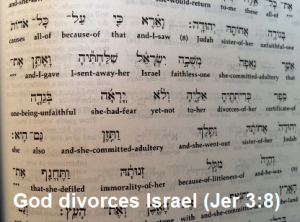 PMT 2016-017 by Kenneth L. Gentry, Jr.
PMT 2016-017 by Kenneth L. Gentry, Jr.
This is the final installment in a four-part series discussing the significance of John’s imagery in Rev 11:2. To get the context of this study, please begin at the first one.
Ekballō and Spousal Divorce
Scripture employs the term ekballō of divorcing one’s wife by sending her out of the house. “As a [technical term] of the LXX for expulsion of a wife, ekballō appears in the citation of Gen 21:10 in Gal 4:30” where Paul refers to the expulsion of Hagar from Abraham’s house (EDNT). In that the judicial backdrop of Rev is God’s divorce decree against Jerusalem/Israel, this fits perfectly with John’s theme stated in Rev 1:7. The excommunication concept (discussed in my previous point) fits nicely also with God’s casting Israel out of his house as a divorced wife, as we shall see.
In the time of Augustus, ekballō also appears in marriage contracts, where a man promises his wife not to “put her away” (ekballein) (M-M, 191). In non-biblical Jewish texts we see ekballō used of divorce in Sir. 7:26; 1 Esd 8:93; 9:20; 2 Esd 10:3; Philo (Det., 40 §147, 149); Flight, 21 [114], and Alleg. Interp. 2:16 §63); Josephus (Ant. 1:18:4 §265; 11:5:4 §145; 16:7:5 §215; 17:4:2 §78). We see this also in Demosthenes (59:63; 83), Andocides (16:29), and Diodorus Siculus (12:18:1). Demosthenes speaks of divorce as casting a wife “out of the house”: ekballō gunaika ek tēs oikias (Liddell-Scott).
I Will Be Your God
by T. M. Moore
This book is dedicated to encouraging such an outlook on life. It does so by promoting a better understanding of the nature, meaning, and implications of living in God’s covenant.
For more study materials, go to: KennethGentry.com
And though the common LXX and NT term for divorce is apostasion (from apolyō, “to set free”), we find the LXX speaking of a divorced woman as one “cast out” (ekballō, Lev 21:7, 14; 22:13-14; Nu 30:9; Eze 44:22). Each of these cases (except for Nu 30:9) appears in levitical discussions. The two Lev 21 statements forbid a priest from marrying divorcees because he is “holy to his God.” Interestingly, when Ezekiel uses the term (ekbeblēmenēn, Eze 44:22) of divorced women whom priests are forbidden to marry, he does so while speaking of the temple and in defining the difference between “the holy and the profane” (Eze 44:23). These levitical uses remind us of Rev where John is speaking of the temple and worship while distinguishing between that which God accepts and that which he rejects (11:1–2).
The reason a divorcee is called “cast out” is due to the final divorce action of sending her away from her husband’s house: “When a man takes a wife and marries her, and it happens that she finds no favor in his eyes because he has found some indecency in her, and he writes her a certificate of divorce and puts it in her hand and sends her out from his house, and she leaves his house and goes and becomes another man’s wife, and if the latter husband turns against her and writes her a certificate of divorce and puts it in her hand and sends her out of his house, or if the latter husband dies who took her to be his wife” (Dt 24:1-3; though exapostelei, not ekballō in LXX). See also Jer 3:1 and Isa 50:1.
God’s House
In a biblical marriage relationship, the husband “rules” over his wife (Ge 3:16). She is under his authority (Nu 5:19-20, 29; cp. Ge 18:12; 1Pe 3:6) in that he is her “head” (Eph 5:23-24; Col 3:17; 1Co 11:3). In the OT God is married to Israel (Isa 54:5a; cp. Isa 50:1; 62:4; Jer. 2:2; 3:14, 20; 31:32; Hos. 1:2; 2:2,7,16; 5:4; 9:1, 10). Consequently, God is Israel’s husband who is “master” (Heb., bāal) over her (Jer 3:1, 14; 31:32). As her husband/master he stands as her Redeemer (Isa 54:5) who protects and provides for her (Eze 16:8-13, 19; Jer 2:2, 7; cp. Eph 5:28-29; 1Pe 3:7; contra. Dt 28:54).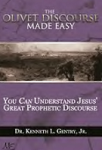
Olivet Discourse Made Easy (by Ken Gentry)
Verse-by-verse analysis of Christ’s teaching on Jerusalem’s destruction in Matt 24. Show the great tribulation is past, having occurred in AD 70.
See more study materials at: www.KennethGentry.com
As noted briefly in Exc 6 (at Rev 5:1), the temple is God’s house according to both the OT (e.g., 1Ki 5–6; Ne 6:10; Ps 27:4; Isa 56:7; Da 5:3) and NT (e.g., Mt 12:4 //; 21:13 //; Lk 11:51; Jn 2:16; Ac 7:47), and Josephus (J.W. 4:3:10 §162–63; 4:4:4 §280–81; 6:2:1 §95; 6:5:3 §300). God’s house is in Jerusalem where he lives: “Whoever there is among you of all His people, may his God be with him! Let him go up to Jerusalem which is in Judah, and rebuild the house of the Lord, the God of Israel; He is the God who is in Jerusalem” (Ezr 1:3; cp. 6:12; 7:15; cf. Ps 9:11; 74:2; 76:2;132:13; Joel 3:17). In providing her a place to live God can prophetically declare: “I will call your land, ‘Married’‘; for the Lord delights in you, and to Him your land will be married” (Isa 62:4). According to E. J. Young, the Land is “possessed so that it will be cared for and protected and no longer abandoned.”
But when Israel sins, God either forsakes his house or drives her out of it: “I will drive them out [ekbalō] of My house! / I will love them no more” (Hos 9:15b, cp. v 17). He laments this necessity: “I have forsaken My house, / I have abandoned My inheritance; / I have given the beloved of My soul / Into the hand of her enemies” (Jer 12:7). In anger he throws her off his property and out of his house: “I will uproot you from My land which I have given you, and this house which I have consecrated for My name I will cast out of [LXX: apostrepsō] My sight, and I will make it a proverb and a byword among all peoples. As for this house, which was exalted, everyone who passes by it will be astonished and say, ‘Why has the Lord done thus to this land and to this house?’” (2Ch 7:20-21). “I will do to the house which is called by My name, in which you trust, and to the place which I gave you and your fathers, as I did to Shiloh. And I will cast you out of My sight, as I have cast out all your brothers, all the offspring of Ephraim. (Jer 7:14–15). Oftentimes the word ekballō is used of this casting out (2Ch 20:11; Jer 12:14-15; 22:28; Zec 7:14).
Israel is driven out for being unfaithful (cp. Jer 3:6, 8, 11-12) to her covenant husband: “the Lord uprooted them from their land in anger and in fury and in great wrath, and cast [exebalan] them into another land, as it is this day” (Dt 29:28). God warns Israel that if she breaks “covenant” with him (Dt 29:25) his wrath would turn her into “burning waste … like the overthrow of Sodom” (Dt 29:23; cp. Rev 11:8). The sanctuary being “trodden down” (cp. Rev 11:2) is tantamount to divorce in that Israel becomes like “those over whom you have never ruled [Heb., mšl], “ i.e., as a husband (Isa 63:18-19; cp. Gen 3:15).
Revelation’s Temple
Thus for John in Rev 11:1–2, while the physical, outer temple (tēn aulēn tēn exōthen) stands, it represents the continuance of unfaithful Israel, the fleshly, outward seed of Abraham (Jn 8:39; Ro 2:17, 28; 9:6; Php 3:4-5). Yet, John’s vision shows the temple is destined for destruction which necessarily entails God’s judgment on the people along with it. The inner temple (naos) and its worshipers represent the faithful remnant in Israel (Ro 11:5; Php 3:3), the spiritual, inward seed of Abraham (Ro 2:29). This also corresponds to Paul’s imagery in Gal 4:30 where still-standing, historical Jerusalem represents unfaithful, fleshly Israel which is to be “cast out” (ekbale) from Abraham’s family like Hagar, while the “Jerusalem above” represents faithful, spiritual Israel.
Later in Rev John sees the “the holy city [tēn polin tēn hagian], new Jerusalem, coming down out of heaven” [katabainousa ek tou ouranou]” (3:12, cp. 21:2, 10) rather than the “holy city” (tēn polin tēn hagian) whose temple is “cast out” (ekbale exōthen, 11:2). The new Jerusalem descends from heaven so that “the nations will walk [peripatēsousin] by its light” (21:24) rather than as when John states the nations “will tread under foot [patēsousin] the holy city” (11:2). Effectively then, the casting out of her temple in 11:2 symbolizes the divorce of the people themselves, when God “sends her out from his house,” as it were, so that he can take a new bride (21:2b).
Conclusion to Series
All three connotations of ekballē as found in Rev 11:2 are related to each other and relevant to John’s theme. All three involve removal from a protective home place: (1) Demons are cast out of the “house” they have taken up in a man (Mt 21:44). (2) Excommunicants are cast out of their faith community which revolves around God’s house (Jn 9:34-35). (3) Divorced wives are cast out of their husbands’ homes (Gal 4:30).
John’s love of multiple meanings surely lies beyond this important image of the casting out of the outer court of the temple in Rev 11:2.
Click on the following images for more information on these studies:











February 25, 2016
REV 11:2 AND ISRAEL CAST OUT (3)
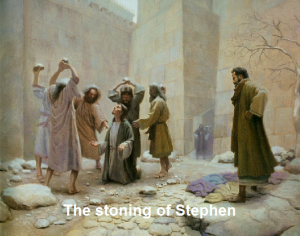 PMT 2016-016 by Kenneth L. Gentry, Jr.
PMT 2016-016 by Kenneth L. Gentry, Jr.
In this blog I continue the thought introduced in my last one. That is, I am continuing to show that Israel was excommunicated by God in AD 70. This is the third in a series on Rev 11:2, and the second in this two-part installment on excommunication. You will need to read the other installments for context.
Corporate Excommunication
The symbolic impact of the temple’s destruction should reinforce the theological reality of her corporate excommunication, for the loss of the temple indicates the removal of the favorable presence of God (2Ch 7:20; Jer 7:14–15). At the end of Rev we learn regarding “the [new] city” of God that “outside [exō] are the dogs” (22:15; cp. Php 3:2). After the vision of the temple’s call for destruction, John hears the seventh angel declare: “The kingdom of the world has become the kingdom of our Lord, and of His Christ; and He will reign forever and ever” (11:15b).
The fact that the temple system and the Jews are symbolized by the “outer court” is significant. Jesus applies the terms ekballe and exōthen (11:2) to the Jews who will be cast outside of God’s kingdom blessings. They will be cast out to where Gentiles dwell: “the sons of the kingdom shall be cast out [ekblēthēsontai] into the outer [exōteron based on exō and related to exōthen ] darkness” (Mt 8:12a; cp. Mt 18:17). Later the Lord uses these two words in his parable regarding Israel’s unworthiness to enter the wedding feast of God’s Son as a sign of judgment. Israel appears in the parable as an improperly dressed intruder: “Then the king said to the servants, ‘Bind him hand and foot, and cast [exbalete] him into the outer [exōteron] darkness” (Mt 22:13).
Thus, 11:1–2 prophesies God’s excommunicating (casting out, ekballein) Israel (cf. Mt 8:12; Gal 4:30) by removing the shadow-copy (external temple structure) — which has become a “den of robbers” (Mt 21:13; cp. Jer 7:11) and was declared “desolate” by Christ (Mt 23:38; cp. Jer 22:5) — so that the essential-real may remain, i.e., the true worshipers and worship, “the remnant according to God’s gracious choice” (Ro 11:5). While the measuring of the inner essence of the temple (11:1) signifies God’s protection of Christianity. Those who believe in Christ will not be “cast out,” for “all that the Father gives Me shall come to Me, and the one who comes to Me I will certainly not cast out” (ekbalō exō , Jn 6:37).
He Shall Have Dominion
(paperback by Kenneth Gentry)
A classic, thorough explanation and defense of postmillennialism (600+ pages). Complete with several chapters answering specific objections.
See more study materials at: www.KennethGentry.com
Christian persecution
In the NT record the Jews are constantly “casting out” Christians either from their synagogues or their cities. And oftentimes for purposes of physical persecution. In his Beatitudes Jesus comforts his followers regarding “when men hate you, and ostracize you, and insult you, and scorn [ekbalōsin] your name as evil, for the sake of the Son of Man” (Lk 6:22). Stephen is “cast out” [ekballō] from Jerusalem before being stoned by the Jews (Ac 7:58). The Jews “drove out” (exebalon) Paul and Barnabas from the city on their first missionary journey (Ac 13:50). The disciples of Christ are constantly having to flee from the Jews (Ac 14:1–6, 19–20; 17:5–9, 13–14; 18:6, 12–17). Before his conversion Paul zealously persecutes believers in Christ in the synagogues and elsewhere (Ac 7:58; 8:1–3; 9:1-9, 21; 22:4–5; 1Co 15:9; Gal 1:13, 23; Php 3:6). John’s Gospel records the fear of the Jews among Christ’s followers during his ministry (Jn 7:13; 19:38; 20:19; cp. 3:1).
Thus, after the Jews spend forty years in efforts to “cast out” believers in Christ, at AD 70 they themselves shall be cast out from God’s presence (Milligan 1903, 180–81). John’s court drama is here implementing the lex talionis. In Dt 19:18–19 God’s law requires that those who press false charges under oath will receive the punishment that would have been due the alleged criminal (cp. Mt 26:60–61). As Rev expresses this irony elsewhere: “Pay her back even as [hōs] she has paid . . . according to her deeds” (18:6). Thus comes the command: “they poured out the blood of saints and prophets, and You have given them blood to drink. They deserve it” (16:6).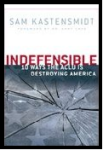
Indefensible (by Sam Kastensmidt)
Sub-title: 10 Ways the ACLU is Destroying America. An Important work in our day of cultural collapse and Christian persecution.
See more study materials at: www.KennethGentry.com
An irony exists in the measuring imagery in 11:1–2. Jesus warns the Jews during him ministry: “Do not judge lest you be judged. For in the way you judge, you will be judged; and by your standard of measure, it will be measured [hō metrō metreite metrēthēsetai] to you” (Mt 7:1–2). Later he informs the chief priests and the Pharisees: “Therefore [dia touto] I say to you, the kingdom of God will be taken away from you, and be given to a nation producing the fruit of it” (Mt 21:43).
Conclusion
It ain’t over, til it’s over. Please catch my next blog for the conclusion to this series.
Click on the following images for more information on these studies:











February 22, 2016
REV 11:2 AND ISRAEL CAST OUT (2)
 PMT 2016-015 by Kenneth L. Gentry, Jr.
PMT 2016-015 by Kenneth L. Gentry, Jr.
In Rev 11:2 we find an important clue to the meaning of the message of Revelation. In this passage we learn that the outer court of the temple is to be cast out. The external court represents the external husk of ancient Judaism, as viewed over against the true essence of Israel. John is here reflecting on Christ’s words in Luke 21:24.
In my last blog article I began a consideration of the significance of the word “cast out” as it applies to the temple’s rejection in AD 70. This is the second installment, highlighting another concept lying behind the image.
Excommunication in Scripture
Scripture employs ekballō for excommunication from one’s faith community (e.g., 3Jn 10). “‘Casting outside’ can also have the nuance of God’s true people who are rejected and persecuted by the unbelieving world” (G. K. Beale). This is important for John in that the Jews are constantly “casting out” Christians either from their synagogues or their cities, as we see in the case of Jesus (Lk 4:29), Stephen (Ac 7:58), and Paul (Ac 13:50). A key issue in Rev is the persecution of believers by the Jews. G. Milligan rightly sees it as “excommunication from the synagogue is in the Seer’s mind,” though he wrongly applies it to “the faithless members of the Christian Church.”
Before Jerusalem Fell
(by Ken Gentry)
Doctoral dissertation defending a pre-AD 70 date for Revelation’s writing. Thoroughly covers internal evidence from Revelation, external evidence from history, and objections to the early date by scholars.
See more study materials at: www.KennethGentry.com
Significantly, the clearest, most detailed, historical example of synagogue excommunication appears in John’s Gospel. There the parents of the blind man whom Jesus heals (Jn 9:1–7) fear (ephobounto) being “put out of the synagogue” (aposunagōgos, v 22). After the Jews confront the man himself, “they put him out” (exabalon auton exō, Jn 9:34–35). John mentions this danger also in Jn 12:42–43 and 16:2, though employing the other, uniquely NT term, aposunagōgos. In 16:2 they believe they are doing God a spiritual service (latreian). Latreia is used of tabernacle/temple service, making it appropriate for our concerns in showing the temple’s judgment (Ro 9:4; Heb 9:1, 6).
Excommunication is particularly significant in that in those days the whole culture and all social relations are governed by ecclesiastical membership. In biblical terms an excommunicant is one who is formally cast outside the boundaries of God’s covenantal love; he is “cut off” from God’s people (Ge 17:14; Lev 7:20; Nu 15:30). Thus, when Jesus speaks of Christian disciplinary procedures within the church, he points out the end result that the excommunicant will “be to you as a Gentile” (Mt 18:17). In 1Co 5:5 Paul speaks of excommunication as delivering one to Satan (showing a conceptual relation to and a reverse image of exorcism). Such ecclesiastical action leads to shunning from one’s community (cf. 2Th 3:14; 1Co 5:2, 13). The problem is quite unlike our modern ecclesiastical anemia where excommunication (if practiced at all) is diluted: excommunicants can simply go to the church next door if they so choose (which would be especially attractive if the new church had a bigger gymnasium).
In fact, excommunication is such a serious matter in ancient Judaism that it can — and often does — involve persecution. “The demise of Jewish membership in the Christian church was hastened by punishment and persecution of Christian Jews within the synagogue, eventually followed by expulsion from the synagogue” (DLNTD). This ecclesiastical exclusion not only involves social ostracizing from family and friends (Mt 10:21, 34-39) but outside the borders of Israel it legally endangers the individual in that “expulsion from the synagogue deprived Christians of the shelter of Judaism and left them vulnerable to the Romans” (C. Setzer). Jesus warns his disciples that in their ministry to Israel they will be dragged before the sunedria (legal courts) and/scourged in the synagogues (Mt 10:16-18). But he promises this persecution will be cut short by his judgment coming against Israel: “But whenever they persecute you in this city, flee to the next; for truly I say to you, you shall not finish going through the cities of Israel, until the Son of Man comes” (Mt 10:23; cp. Rev 1:7; 3:9, 11).
(by Ken Gentry)
Helpful introduction to Revelation presenting keys for interpreting. Also provides studies of basic issues in Revelation’s story-line.|
See more study materials at: www.KennethGentry.com
As indicated above, ekballō is used in contexts where people are removed from their homes and social settings. In that exodus imagery is a recurring phenomenon in Rev, it may be significant that in the OT we read of Pharaoh “casting out [ekbalein, LXX]” (Ex 6:1; 11:1; 12:33) the Jews from his “house,” the “house of slavery” (Ex 13:3, 14; 20:2; Dt 5:6; 7:8). Interestingly, the LXX uses this term of the expulsion of the Canaanites from their land and homes as the result of the exodus: “The Lord will drive out [ekbalei] all these nations from before you, and you will dispossess nations greater and mightier than you” (Dt 11:23; cp. Ex 23:28-31; 33:2; 34:11; Dt 11:23; 33:27; Jos 24:12, 18; Jdg 6:9; 1Ch 17:21). The Jews are given “houses” and “cities” they did not build (Dt 6:10-11; 19:1; Jos 24:13). But God warns Israel that she herself will be “cast out” from the land if she disobeys him: “The Lord uprooted them from their land in anger and in fury and in great wrath, and cast [exebalen] them into another land, as it is this day” (LXX Dt 29:28; 2Ki 17:20; Jer 7:15; 52:3). In Rev 11:2 the casting out of the temple itself represents Israel’s being cast off God’s property for her disobedience.
Temple Cleansing
Significantly, at both the beginning (Jn 2:15) and end (Mt 21:12 //) of his ministry, Jesus “cast out” (ekballō) Jews from the temple. In both contexts we have clear allusions to the temple’s coming destruction: After cleansing the temple in Jn 2:15 Jesus publicly declares: “Destroy this temple, and in three days I will raise it up” (Jn 2:19). He is speaking of his body (v 21), of course, but commentators widely agree that this also includes a warning of the temple’s eventual demise. In fact, his statement is surely a double entendre, so that “the spiritual destruction of Israel’s temple occurred decisively at Jesus’ death and resurrection, and its physical demise came finally in AD 70” (Beale).
In the context of his later cleansing in Mt 21:12, he curses the fig tree (vv 19–20) as an enacted parable alluding to Israel’s lack of fruit and her coming demise. Then, Jesus immediately explains that “if you have faith, and do not doubt, you shall not only do what was done to the fig tree, but even if you say to this mountain, ‘Be taken up and cast into the sea,’ it will happen (v 21). Since Mount Zion is the location of the temple (Jer 50:28; Mic 3:12), a number of commentators see this also as indicating the temple’s destruction: “The evident proverbial nature of the saying should not disguise the fact that someone speaking of ‘this mountain’ being cast into the sea, in the context of a dramatic action of judgment in the Temple, would inevitably be heard to refer to Mount Zion” (N. T. Wright).
Jesus’ Parable
Jesus also employs the term ekballō in a parable forewarning the Jews of the coming destruction of the temple. This occurs because they “cast out” (exebalon auton exō) the “heir” (Christ) from the “vineyard” (Israel), even though he was the vineyard owner’s (God’s) son (Mk 12:8; Mt 21:37, 39). Jesus points out the consequences of their action: “What will the owner of the vineyard do? He will come and destroy the vine-growers, and will give the vineyard to others” (Mk 12:9). This occurs when the Romans “tread under foot the holy city” (Rev 11:2b) after it is “cast out” (11:2a). The “Jerusalem below” is in bondage and will be “cast out” (ekbale, Gal 4:30; cp. Philo, Cher 1:3:9).
Because of their lack of covenant faith (Mt 8:10; cp. Ge 15:6; Heb 4:12) the Jews are being “cast out” of God’s kingdom while the Gentiles are entering in: “Many shall come from east and west, and recline at the table with Abraham, and Isaac, and Jacob, in the kingdom of heaven; but the sons of the kingdom shall be cast into the outer darkness [ekblēthēsantai eis to skotos to exōteron]; in that place there shall be weeping and gnashing of teeth” (Mt 8:11-12).
Stay tuned! I continue this study in my next blog.
Click on the following images for more information on these studies:
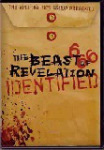










Kenneth L. Gentry Jr.'s Blog
- Kenneth L. Gentry Jr.'s profile
- 85 followers



